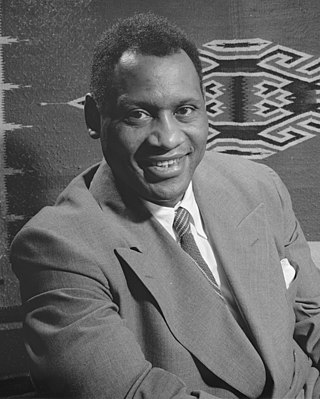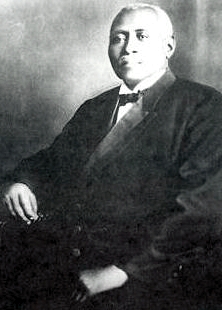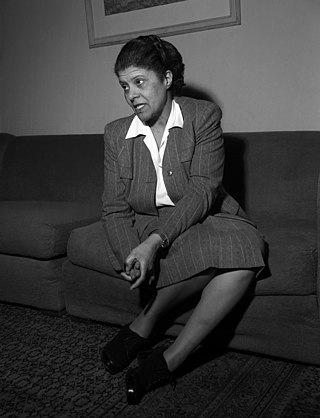Related Research Articles
"Go Down Moses" is an African American spiritual that describes the Hebrew exodus, specifically drawing from Exodus 5:1: "And the LORD spoke unto Moses, Go unto Pharaoh, and say unto him, Thus saith the LORD, Let my people go, that they may serve me", where God commands Moses to demand the release of the Israelites from bondage in Egypt. As is common in spirituals, the song discusses freedom, referring both to the freedom of the Israelites, and that of runaway enslaved people. As a result of these messages, this song was outlawed by many enslavers.

Paul Leroy Robeson was an American bass-baritone concert artist, stage and film actor, professional football player, and activist who became famous both for his cultural accomplishments and for his political stances.

Itzik Feffer, also Fefer was a Soviet Yiddish poet executed on the Night of the Murdered Poets during Joseph Stalin's purges.
The Peekskill riots took place at Cortlandt Manor, New York in 1949. The catalyst for the rioting was an announced concert by black singer Paul Robeson, who was well known for his strong pro-trade union stance, civil rights activism, communist affiliations, and anti-colonialism. The concert, organized as a benefit for the Civil Rights Congress, was scheduled to take place on August 27 in Lakeland Acres, just north of Peekskill.
"Ol' Man River" is a show tune from the 1927 musical Show Boat with music by Jerome Kern and lyrics by Oscar Hammerstein II, who wrote the song in 1925. The song contrasts the struggles and hardships of African Americans with the endless, uncaring flow of the Mississippi River. It is sung from the point of view of a black stevedore on a showboat, and is the most famous song from the show. The song is meant to be performed in a slow tempo; it is sung complete once in the musical's lengthy first scene by the stevedore "Joe" who travels with the boat, and, in the stage version, is heard four more times in brief reprises. Joe serves as a sort of musical one-man Greek chorus, and the song, when reprised, comments on the action, as if saying, "This has happened, but the river keeps rolling on anyway."

Roy Ottoway Wilkins was a prominent activist in the Civil Rights Movement in the United States from the 1930s to the 1970s. Wilkins' most notable role was his leadership of the National Association for the Advancement of Colored People (NAACP), in which he held the title of Executive Secretary from 1955 to 1963 and Executive Director from 1964 to 1977. Wilkins was a central figure in many notable marches of the civil rights movement. He made valuable contributions in the world of African-American literature, and his voice was used to further the efforts in the fight for equality. Wilkins' pursuit of social justice also touched the lives of veterans and active service members, through his awards and recognition of exemplary military personnel.

William Drew Robeson I was the minister of Witherspoon Street Presbyterian Church in Princeton, New Jersey from 1880 to 1901 and the father of Paul Robeson. The Witherspoon Street Presbyterian Church had been built for its black members by the First Presbyterian Church of Princeton.

Joshua Daniel White was an American singer, guitarist, songwriter, actor and civil rights activist. He also recorded under the names Pinewood Tom and Tippy Barton in the 1930s.

The Proud Valley is a 1940 Ealing Studios film starring Paul Robeson. Filmed in the South Wales coalfield, the principal Welsh coal mining area, the film is about a seaman who joins a mining community. It includes their passion for singing as well as the dangers and precariousness of working in a mine.

"Sun City" is a 1985 protest song written by Steven Van Zandt, produced by Van Zandt and Arthur Baker and recorded by Artists United Against Apartheid to convey opposition to the South African policy of apartheid. The song declared that all the artists involved would refuse to perform at Sun City, a resort which was located in the bantustan of Bophuthatswana, one of a number of internationally unrecognized states created by the South African government to forcibly relocate its black population.

Sanders of the River is a 1935 British film directed by the Hungarian-British director, Zoltán Korda, based on the stories of Edgar Wallace. It is set in Colonial Nigeria. The lead Nigerian characters were played by African Americans Paul Robeson and Nina Mae McKinney. The film proved a significant commercial and critical success, giving Korda the first of his four nominations for Best Film at the Venice Film Festival.
The Council on African Affairs (CAA), until 1941 called the International Committee on African Affairs (ICAA), was a volunteer organization founded in 1937 in the United States. It emerged as the leading voice of anti-colonialism and Pan-Africanism in the United States and internationally before Cold War anti-communism and liberalism created too much strife among members; the organization split in 1955. The split was also precipitated by co-founder Max Yergan's abandonment of left-wing politics; he advocated colonial rule in Africa.
Paul Leroy Robeson Jr. was an American author, archivist and historian.

Eslanda "Essie" Cardozo Goode Robeson was an American anthropologist, author, actress, and civil rights activist. She was the wife and business manager of performer Paul Robeson.
The Song of the Rivers is a 1954 documentary film production by the East Germany film studio DEFA. Dutch filmmaker Joris Ivens was the leading director. The sprawling film celebrates international workers movements along six major rivers: the Volga, Mississippi, Ganges, Nile, Amazon and the Yangtze. Shot in many countries by different film crews, and later edited by Ivens, Song of the Rivers begins with a lyrical montage of landscapes and laborers and proceeds to glorify labor and modern industrial machinery. The musical score is by Dmitri Shostakovich, with lyrics written by Bertolt Brecht, and songs performed by German communism's star Ernst Busch and famous American actor, singer and activist Paul Robeson who also narrates. Song of the Rivers is an ode to international solidarity.

Here I Stand is a 1958 book written by Paul Robeson with the collaboration of Lloyd L. Brown. While Robeson wrote many articles and speeches, Here I stand is his only book. It has been described as part manifesto, part autobiography. It was published by Othello Associates and dedicated to his wife Eslanda Goode Robeson.
Entertainer and activist Paul Robeson's political philosophies and outspoken views about domestic and international Communist countries and movements were the subject of great concern to the western mass media and the United States Government, during the Cold War. His views also caused controversy within the ranks of black organizations and the entertainment industry.
The US congressional testimony by Jackie Robinson, the first African-American Major League Baseball player of the modern era, against the famous entertainer and international civil rights activist Paul Robeson, was an American Cold War incident. Its events were precipitated when, at an international student peace conference held in Paris on April 20, 1949, Robeson allegedly made a speech to the effect that African Americans would not support the United States in a war with the Soviet Union, due to continued second-class citizen status under United States law. This subsequent controversy caused the House Committee on Un-American Activities (HUAC) to investigate Robeson and Robinson, as a famed African-American baseball player, was called on to impugn Robeson.

Sing Your Song is a 2011 documentary that tells the story of Harry Belafonte. The film recounts his life and legacy, not only as a great entertainer, but as an important activist in the Civil Rights Movement.

Freedom was a monthly newspaper focused on African-American issues published from 1950 to 1955. The publication was associated primarily with the internationally renowned singer, actor and then officially disfavored activist Paul Robeson, whose column, with his photograph, ran on most of its front pages. Freedom's motto was: "Where one is enslaved, all are in chains!" The newspaper has been described as "the most visible African American Left cultural institution during the early 1950s." In another characterization, "Freedom paper was basically an attempt by a small group of black activists, most of them Communists, to provide Robeson with a base in Harlem and a means of reaching his public... The paper offered more coverage of the labor movement than nearly any other publication, particularly of the left-led unions that were expelled from the CIO in the late 1940s... [It] encouraged its African American readership to identify its struggles with anti-colonial movements in Africa, Asia, and the Caribbean. Freedom gave extensive publicity to... the struggle against apartheid."
References
- 1 2 "Africa Sings". Archived from the original on 20 February 2012. Retrieved 13 February 2009.
- ↑ Dyer, Richard. Heavenly Bodies, 2004, pg 100.
- ↑ (Africa Looks Up publicity booklet n.d.:1;quoted by Schlooser 1970:pg.524).
- ↑ Duberman, Martin. Paul Robeson, 1989,Berlin, Moscow, Films pg 202.
- 1 2 Duberman, Martin. Paul Robeson, 1989,Berlin, Moscow, Films pg 203.
- ↑ Davis, Peter. In Darkest Hollywood: Exploring the Jungles of Cinema's South Africa, 1996, pgs 142-144.
- ↑ (My Song Goes Forth,publicity sheet,Ambassador Films n.d.:2;quoted by Schlooser,ibid.:255).